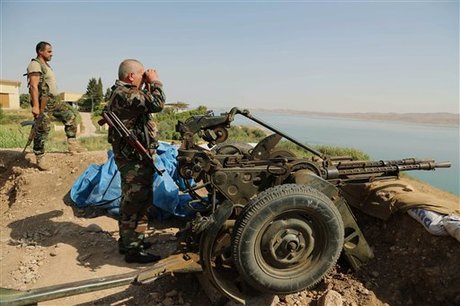Iraq Kurds Fight Jihadists, their Worst Threat Since Saddam
إقرأ هذا الخبر بالعربية
Iraqi Kurdish forces battling jihadists face their biggest threat since brutal crackdowns by Saddam Hussein's regime, beset by challenges including lacking experience, training and supplies and a huge front to defend.
An early August drive by the Islamic State (IS) jihadists group in the northern Iraqi province of Nineveh pushed Kurdish fighters, known as peshmerga, back toward the capital of their autonomous region and forced tens of thousands of civilians to flee.
Unlike some Iraqi army units earlier in the year, the peshmerga held together, and are now starting to claw back ground with support from U.S. air strikes, elite federal forces and international arms shipments.
But they still face a difficult road.
"Training is very limited by Western standards. Armament is uneven," with some units having body armour, vehicles and some heavy weapons, while others are part-time volunteers who may even have to provide their own gear, said Michael Knights, a fellow at The Washington Institute for Near East Policy.
And they face a formidable foe in experienced IS fighters, who spearheaded a militant assault in June that overran large areas of five Iraqi provinces before launching the renewed northern drive in August, and have also been fighting in Syria's civil war.
"The Islamic State are well-trained, and they have a lot of weapons they captured from the fleeing Iraqi army," said peshmerga Major General Sardar Kamal.
And IS "had the element of surprise to begin with," he said.
"Now with air support, with some intelligence and targeting help from the U.S. and... more equipment and ammunition, they're far better off," Anthony Cordesman of the International Institute for Strategic Studies said of the peshmerga.
"But they're not a force that was really designed or ready to deal with the Islamic State forces on their own."
In an indication of how harshly the Kurds view IS, another peshmerga commander, Major General Abdulrahman al-Kawiri, said the group "is worse than Saddam".
It is an emotive assertion for a member of Iraq's Kurdish community, which was targeted in a genocidal campaign in the 1980s by the now-executed dictator's regime that killed tens of thousands of people.
- Recent experience lacking -
The peshmerga, which means "those who face death" in Kurdish, are famed as hardy guerrilla fighters who battled Saddam's forces in past years, but many fighters from a new generation now man the front lines.
They "at one point had a much higher level of readiness than they do now," said Cordesman, noting that while the peshmerga have faced off with Iraqi federal security forces over disputed territory, it has "not been a fighting situation".
"Their reputation as guerrilla fighters was earned and can never be challenged," said Knights.
"But this reputation has been misapplied to a new generation who never were guerrillas, whilst it has been wrongly assumed that the guerrilla experiences of older peshmerga leaders means that they are good at modern light infantry fighting."
Another issue is the large area the peshmerga now have to defend.
The jihadist-led offensive that began in June swept aside federal army and police forces in areas across the north.
The departure of these forces allowed the Kurds to advance into a swathe of territory stretching across north Iraq that they want to incorporate into their autonomous region, a move Baghdad has long opposed.
While the advance took them closer to realising a long-held territorial dream, it also gave Kurdish forces a much larger area to defend.
Previously, "the only thing they had to hold were major crossing points" from the three-province Kurdish region to federal areas, said Cordesman.
Holding "a very large border area against the forces of the Islamic State is a lot more demanding, and... is a more difficult tactical situation," he said.
To defeat IS, the Kurds "need more troops, more equipment, more training, and crucially more money to pay for it all," said John Drake, a security analyst with the AKE Group consultancy.
But the dire situation the Kurds faced earlier this month and growing international concern over the threat of IS have combined to put them in a stronger position, pushing the U.S. to back them with air strikes and drawing pledges from various countries to provide them with arms.



